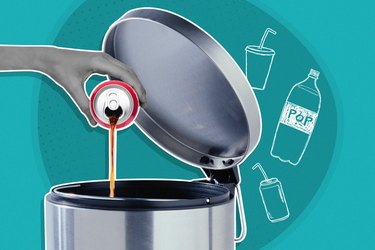
Many people have grown up considering fruit juices, like orange juice or apple juice, a healthy diet staple. After all, there was a time when it was unlikely you'd see a breakfast commercial that didn't feature a glass of OJ as part of a "nutritious breakfast."
While fruit juice does provide vitamins and minerals, there are a number of drawbacks to these drinks that have been shrouded by the guise of a health halo.
Video of the Day
Video of the Day
That doesn't mean you need to cut it out of your diet entirely: 100 percent fruit juice without added sugars can be part of a healthy diet, per the 2020-2025 Dietary Guidelines for Americans. Still, drinking fruit juice doesn't provide all the benefits that eating a piece of fruit would.
While the USDA considers 1 cup of fruit juice equivalent to 1 cup of fruit toward your daily recommended intake, it notes that fruit in its whole form provides more benefits, including filling dietary fiber that can help reduce cholesterol levels and lower a person's risk for heart disease.
Here's what really happens when you drink fruit juice every day, and how to fit it into a healthy diet.
Related Reading
1. Your Blood Sugar Might Spike
Expect to experience a sugar rush and crash when you drink too much fruit juice.
"Whenever you drink juice, the sugars found naturally in the juice in addition to any additional sugars added quickly get absorbed into your body," Alexandra Salcedo, RD, a registered dietitian at U.C. San Diego Health tells LIVESTRONG.com. "This quick absorption of energy leads to an increase in blood sugar."
Your pancreas creates a hormone called insulin, which is continuously released into the bloodstream, per the University of California San Francisco (UCSF). Insulin's job is to drive sugar out of the bloodstream and into muscle, fat and liver cells where it can be stored for use later on. Your body carefully calibrates insulin levels in your bloodstream, and when you have low insulin levels, sugar is released back into the bloodstream.
Type 2 diabetes is believed to be a progression from normal blood sugar levels to pre-diabetes and eventually a diagnosis of overt diabetes, per UCSF. Each of these stages is defined by blood sugar levels. Pre-diabetes and diabetes occur when the pancreas cannot make enough insulin to balance blood sugar.
"Patients who have diabetes or have issues with managing their blood sugar levels will see an increase in blood sugar with fruit juice," Salcedo says. "High consumption of fruit juice can negatively affect blood sugar management with people with diabetes or patients on steroid medications."
It's High-Glycemic
Foods are assigned a glycemic index number based on how slowly or quickly they increase blood glucose levels, per Harvard Health Publishing.
People with pre-diabetes or diabetes need to concentrate on low-glycemic index foods; those with type 1 diabetes can't produce enough insulin and those with type 2 diabetes are resistant to insulin. With both types of diabetes, high-glycemic foods can lead to spikes in blood sugar levels.
Apple juice has a glycemic index of 44 and orange juice has a glycemic index of 50, only slightly below that of soda, which has a glycemic index of 63, per Oregon State University. To put that in perspective, honey has a glycemic index of 61.
Comparatively, a whole raw apple has a glycemic index of just 39 and a whole raw orange has a glycemic index of just 40.
"People who have diabetes or pre-diabetes should avoid drinking juice, as it will cause a spike in blood sugar which could therefore lead to insulin resistance," Salcedo says. "I would highly recommend just eating the fruit whole rather than drinking it in juice form."
2. You May Add More Vitamins and Minerals to Your Diet
Juice has traditionally been touted for its benefits, and those still exist despite its effect on blood sugar.
"Fruit juice can offer some health benefits, including a variety of vitamins and minerals," registered dietitian Shena Jaramillo, RD, says. "Juices such as orange juice and apple juice offer vitamin C, which helps with iron absorption, inflammation reduction and strengthened immunity. Some juices are also fortified with calcium and iron, which help with blood flow and bone mineral density."
Consider the nutrition profile of orange juice and apple juice:
Orange Juice (per 1-cup serving)
- Calories: 112
- Total fat: 0.5 g
- Carbohydrates: 25.8 g
- Total sugars: 20.8 g
- Protein: 1.7 g
- Vitamin C: 124 mg (138% DV)
- Potassium: 496 mg (11% DV)
- Iron: 0.5 mg (3% DV)
- Calcium: 27.3 mg (2% DV)
Apple Juice (per 1-cup serving)
- Calories: 114
- Total fat: 0.3 g
- Carbohydrates: 28 g
- Total sugars: 23.9 g
- Protein: 0.2 g
- Potassium: 250.5 mg (5% DV)
- Vitamin C: 2.2 mg (2% DV)
- Calcium: 19.8 mg (2% DV)
- Iron: 0.3 mg (2% DV)
These nutrients, though, aren't unique to fruit juice — meaning you can get them, plus other benefits like fiber, from eating whole fruit and other foods.
"While we can get some micronutrients from juice, we can likely get them from other sources in the diet easily," Jaramillo says.
Tip
If you do decide to opt for fruit juice, keep in mind that not all are created equal. “One hundred percent fruit juice concentrate, with pulp, and fortified are the healthiest options if you are going to drink juice,” Salcedo says.
3. You’ll Be Missing Out on Fiber
If you're drinking fruit juice as a replacement for whole fruits, you'll be missing out on the fruit's fiber, which is one of the nutrients that make produce so healthy in the first place.
"I like to think of drinking fruit juice, such as orange juice, like sitting down with four to five oranges, squeezing all of the juice out and tossing the fiber," Jaramillo says. While a cup of orange juice contains just 0.5 grams of fiber, a large whole orange contains 4.4 grams of fiber, per the USDA.
Similarly, a cup of apple juice contains 0.5 grams of fiber, but a large apple contains 5.4 grams of fiber, also per the USDA.
Fiber plays an important role in an overall healthy diet: It lowers cholesterol levels, normalizes bowel movements and maintains bowel health, helps you maintain a healthy weight and helps control blood sugar levels, per the Mayo Clinic.
Whole fruits like apples and oranges contain a type of fiber called soluble fiber, which may decrease blood cholesterol levels and improve blood sugar levels, according to the Mayo Clinic. Soluble fiber can also reduce gas and bloating.
Insoluble fiber, which is found in foods including fruits with edible peels (like apples), vegetables and whole-grain products (like cereals and brown rice), helps move material through your digestive system.
Eating these types of whole fruits (particularly apples, grapes and blueberries) was significantly associated with a lower risk of developing type 2 diabetes, whereas drinking more fruit juice was associated with a higher risk of type 2 diabetes, per an August 2013 study in the British Medical Journal. The study authors tracked the diets of more than 187,000 people and noted that fiber could be one component responsible for the beneficial effects.
Most Americans don't get enough fiber: Daily dietary fiber intake averages about 15 grams per day, falling short of the recommended total dietary intake of 25 to 30 grams of fiber per day, per UCSF.
Related Reading
4. You May Gain Weight
Fruit juice can be high in calories, which may lead to weight gain if you drink too much of it over time.
"If someone is drinking more than one 8-ounce glass of juice a day, it could certainly lead to weight gain," Jaramillo says. "From a caloric perspective, drinking multiple glasses of juice per day is equivalent to drinking multiple sodas. It doesn't really offer any additional nutritional value, but it does load up the calories and sugar."
If you stick to one 8-ounce glass of juice per day and have an otherwise balanced diet and exercise routine, you likely won't see any negative consequences from sipping a daily juice, Jaramillo adds. It's easy to drink far more than the 1-cup serving size when you pour yourself a glass of fruit juice without thinking about the serving size.
"This is mostly related to the average size of household glasses — a tall glass is typically at least 16 ounces (two servings) of juice, which can be over 300 calories," Jaramillo says. "If choosing a tall glass, fill it half full or ensure you have smaller glasses on hand to choose for juice."
Related Reading
5. Your Teeth May Suffer
What you eat and drink can affect your teeth — in the case of too much fruit juice, it's possible you may up your risk for permanent tooth erosion.
This can lead to pain or sensitivity when drinking hot, cold or sweet drinks, a yellowish discoloration of the teeth and a greater risk of cavities, per the American Dental Association (ADA).
Acidic drinks like apple and orange juice can contribute to erosion, so it's best to make these an occasional treat rather than a daily habit, according to the ADA.
The Bottom Line
If you drink fruit juice daily, you'll be fitting some important nutrients into your diet — but you can also get these nutrients from other foods, without the drawbacks of fruit juice.
The negative effects of drinking fruit juice may include potential weight gain, tooth decay and spikes in your blood sugar levels.
In particular, drinking fruit juice daily may be risky for those with diabetes. "With certain medical conditions such as diabetes, juice consumption can lead to rapid spikes and drops in blood sugars, which can be problematic," Jaramillo says.
You'll also miss out on the many health benefits of fiber if you replace whole fruit with fruit juice. "I would recommend eating the whole fruit versus fruit juice to get the fiber and other nutrients found naturally in the fruit," Salcedo says.
"You can occasionally imbibe in your favorite fruit juice, but I wouldn't recommend having it daily."
- United States Department of Agriculture: "2020-2025 Dietary Guidelines for Americans"
- U.S. Department of Agriculture: "Fruits"
- University of California San Francisco: "Controlling Blood Sugar"
- Oregon State University: "Glycemic index and glycemic load for 100+ foods"s"
- MyFoodData: "Orange Juice"
- MyFoodData: "Apple Juice"
- MyFoodData: "Oranges"
- MyFoodData: "Apples"
- Mayo Clinic: "Dietary fiber: Essential for a healthy diet"
- Harvard Health Publishing: "Easy Ways to Stay Regular"
- British Medical Journal: "Fruit consumption and risk of type 2 diabetes: results from three prospective longitudinal cohort studies"
- American Dental Association: "Erosion: What You Eat and Drink Can Impact Teeth"
- Frontiers in Public Health: "100% Fruit Juice and Dental Health: A Systematic Review of the Literature"



